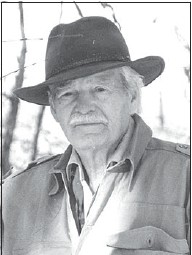Howard Hong,
a longtime summer resident of Hovland, died in Northfield on March 16, 2010. He was 97.
He was born in Wolford, N.D. on Oct. 19, 1912, but grew up in Willmar, Minn. He graduated from St. Olaf College in 1934 and was awarded a Ph. D. from the University of Minnesota in 1938. He was a member of the St. Olaf faculty from 1938 until he retired in 1978, and was a legendary teacher. He and his wife Edna were widely recognized as translators of the works of the Danish writer Søren Kierkegaard (1813- 1855). Many honors came their way. Theyalso founded a special library at St. Olaf which bears their name: The Howard and Edna Hong Kierkegaard Library. It enjoys an international reputation.
He and Edna were as at home in Hovland as they were in Northfield. With one exception, they spent their summers at Hovland from 1945 to the end of their lives. During World War II, he worked with prisoners of war in camps in both Missouri and Iowa; after the war, the Hongs lived in Germany, where he worked in refugee camps and helped resettle over 250,000 refugees, 250 of them in Northfield alone. That work, he said, had been both “heart-breaking and heart-warming.” They were exhausted by what they had seen and done, and sought rest in Hovland.
Thesounds of Lake Superior and the silence of the woods helped to heal them; those sounds and that silence also
renewed them annually for the
demands of their Northfield life. h
So did their Hovland friends
and the congregation at Trinity n
Lutheran Church.
They always worked at top speed. One example — after he retired at 65 from St. Olaf, he and Edna took on a new job, a uniform 25-volume edition of Kierkegaard’s Writings,
published
by Princeton University
Press. They translated 21 of f
these volumes and assigned four
to others; he did the detailed
n
editorial work on all of the volumes.
h
This edition was completed
in 1990, when he was 77. He produced 25 volumes in 12 years. Hovland saw them through the strain of this major post-retirement project.
The Hongs first rented the upper floor of a boat house on Lake Superior that belonged to a Norwegian immigrant fisherman, Jacob Newman. Then they built a “shack” away from the shore and next to the Brule River. After Newman’s death,
they bought his cabin, while
keeping their place on the Brule.
f
They called the cabin “Jacob’s
Place.” It and the shack and
d
Trinity were the centers of Hong
life in Hovland.
In a speech, Edna once described their life by the Brule: “I don’t need running water, electricity, indoor plumbing. I feel very comfortable with spider webs; the deer mice . . . do not dismay me if they have babies in our cabin. An old fashioned wood range is a joy to cook on and bake in. Lugging water [a quarter of a mile] from a spring is an exercise in soulsolitude. No radio, no telephone, no TV is bliss!”
Howard Hong worked with fellow congregation members in planning for a new Trinity Lutheran Church. Before construction started, he and Edna were called to their refugee work in Germany. Arnold and Evelyn Flaten took their place and in three successive summers (1946-48) supervised the St. Olaf students who helped congregation members build the church. Thiswas a congregational project.
One member was Oscar Sundquist, who owned a garage. He repaired all the equipment used in the construction, including a workhorse jeep Howard Hong had bought for $45 in Paris after the war. The students stayed with a Hovland man, Mons Hanson, who gave the land on which the church now stands; he was remembered long afterwards by both the students and the Flatens.
Howard Hong was active in Hovland life in another way. He bought many tracts of land in the area by paying delinquent taxes. The land had been logged over by timber companies; largely at his own expense, he restored it according to a plan he devised with the help of an experienced forester, Dave Eggen of Moose Lake. In 1991, he and Edna were given the Minnesota Outstanding Conservationist Award by the Minnesota Association of Soil and Water Conservation Districts. He enjoyed introducing himself as a “forester.”
The funeral service for Howard Hong is at Boe Memorial Chapel, on the campus of St. Olaf College at 11 a.m. Saturday, March, 27. The burial service is at Trinity Lutheran Church at 2 p.m. Monday, March 29. He will be buried next to Edna.



Loading Comments